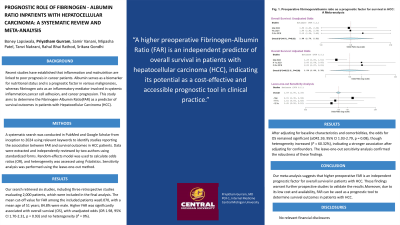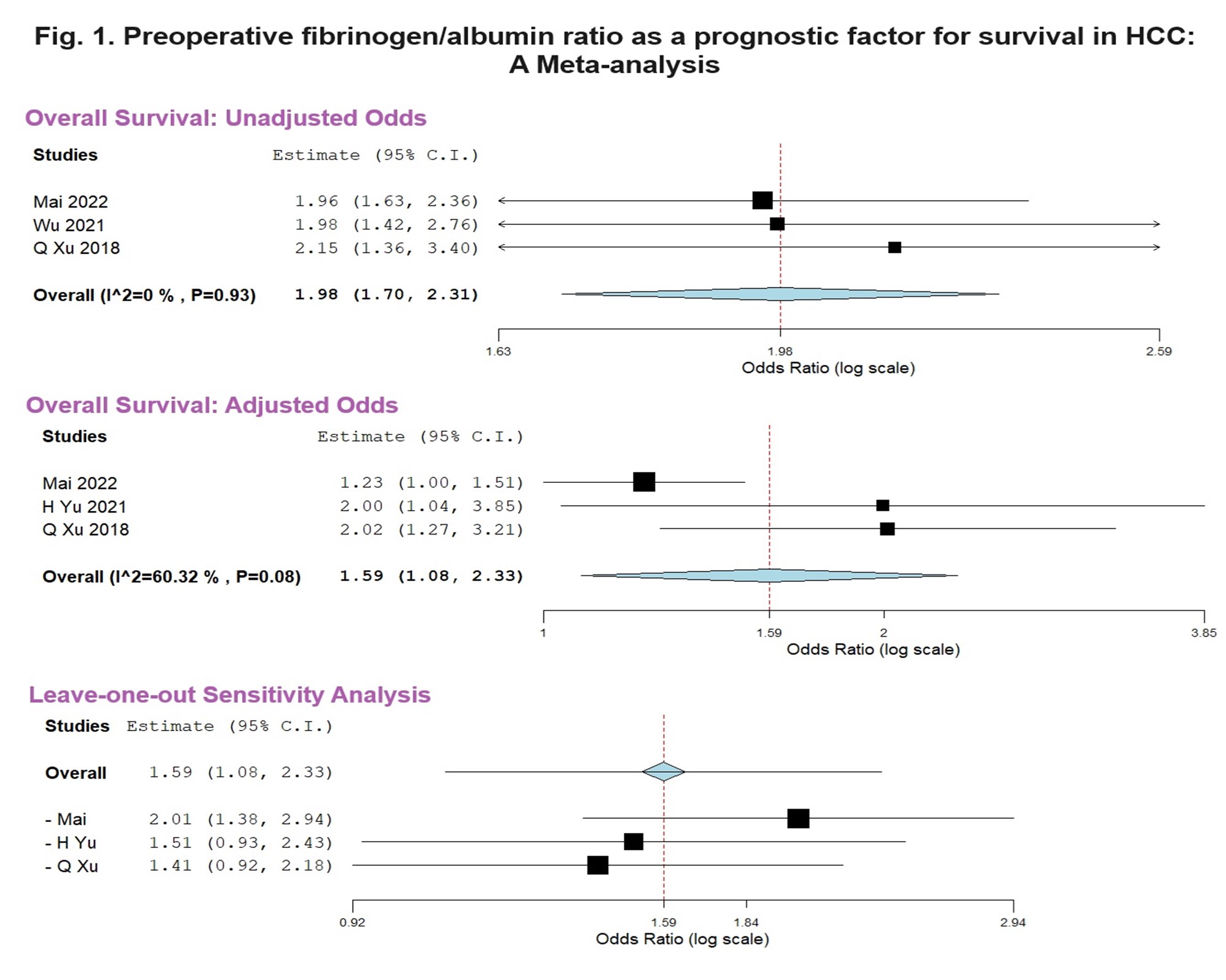Sunday Poster Session
Category: Liver
P1181 - Prognostic Role of Fibrinogen - Albumin Ratio in Patients with Hepatocellular Carcinoma: A Systematic Review and Meta-Analysis
Sunday, October 27, 2024
3:30 PM - 7:00 PM ET
Location: Exhibit Hall E

Has Audio
- PG
Priyatham Gurram, MD
Central Michigan University College of Medicine
Saginaw, MI
Presenting Author(s)
Boney Lapsiwala, MD1, Priyatham Gurram, MD2, Samir Vanani, MBBS3, Mipasha Patel, MBBS4, Tanvi Nakrani, 5, Rahulbhai Rathod, MBBS3, Srikara Gondhi, MBBS6
1Medical City Arlington, Denton, TX; 2Central Michigan University College of Medicine, Saginaw, MI; 3Government Medical College, Surat, Gujarat, India; 4Government Medical College and Hospital, New Jersey, NJ; 5Clillova Research Solution, Long Beach, CA; 6Advocate Illinois Masonic Medical Center, Chicago, IL
Introduction: Recent studies have established that inflammation and malnutrition are linked to poor prognoses in cancer patients. Albumin serves as a biomarker for nutritional status and is a prognostic factor in various malignancies, whereas fibrinogen acts as an inflammatory mediator involved in systemic inflammation, cancer cell adhesion, and cancer progression. This study aims to determine the Fibrinogen-Albumin Ratio (FAR) as a predictor of survival outcomes in patients with Hepatocellular Carcinoma (HCC).
Methods: A systematic search was conducted in PubMed and Google Scholar from inception to 2024 using relevant keywords to identify studies reporting the association between FAR and survival outcomes in HCC patients. Data were extracted and independently reviewed by two authors using standardized forms. A random-effects model was used to calculate odds ratios (OR), and heterogeneity was assessed using I² statistics. Sensitivity analysis was performed using the leave-one-out method.
Results: Our search retrieved six studies, including three retrospective studies evaluating 2,000 patients, which were included in the final analysis. The mean cut-off value for FAR among the included patients was 0.070, with a mean age of 51 years; 84.8% were male. Higher FAR was significantly associated with overall survival (OS), with unadjusted odds (OR 1.98, 95% CI 1.70-2.31, p = 0.93) and no heterogeneity (I² = 0%). After adjusting for baseline characteristics and comorbidities, the odds for OS remained significant (aOR 1.59, 95% CI 1.03-2.79, p = 0.08), though heterogeneity increased (I² = 60.32%), indicating a stronger association after adjusting for confounders. The leave-one-out sensitivity analysis confirmed the robustness of these findings.
Discussion: Our meta-analysis suggests that higher preoperative FAR is an independent prognostic factor for overall survival in patients with HCC. These findings warrant further prospective studies to validate the results. Moreover, due to its low cost and availability, FAR can be used as a prognostic tool to determine survival outcomes in patients with HCC.

Disclosures:
Boney Lapsiwala, MD1, Priyatham Gurram, MD2, Samir Vanani, MBBS3, Mipasha Patel, MBBS4, Tanvi Nakrani, 5, Rahulbhai Rathod, MBBS3, Srikara Gondhi, MBBS6. P1181 - Prognostic Role of Fibrinogen - Albumin Ratio in Patients with Hepatocellular Carcinoma: A Systematic Review and Meta-Analysis, ACG 2024 Annual Scientific Meeting Abstracts. Philadelphia, PA: American College of Gastroenterology.
1Medical City Arlington, Denton, TX; 2Central Michigan University College of Medicine, Saginaw, MI; 3Government Medical College, Surat, Gujarat, India; 4Government Medical College and Hospital, New Jersey, NJ; 5Clillova Research Solution, Long Beach, CA; 6Advocate Illinois Masonic Medical Center, Chicago, IL
Introduction: Recent studies have established that inflammation and malnutrition are linked to poor prognoses in cancer patients. Albumin serves as a biomarker for nutritional status and is a prognostic factor in various malignancies, whereas fibrinogen acts as an inflammatory mediator involved in systemic inflammation, cancer cell adhesion, and cancer progression. This study aims to determine the Fibrinogen-Albumin Ratio (FAR) as a predictor of survival outcomes in patients with Hepatocellular Carcinoma (HCC).
Methods: A systematic search was conducted in PubMed and Google Scholar from inception to 2024 using relevant keywords to identify studies reporting the association between FAR and survival outcomes in HCC patients. Data were extracted and independently reviewed by two authors using standardized forms. A random-effects model was used to calculate odds ratios (OR), and heterogeneity was assessed using I² statistics. Sensitivity analysis was performed using the leave-one-out method.
Results: Our search retrieved six studies, including three retrospective studies evaluating 2,000 patients, which were included in the final analysis. The mean cut-off value for FAR among the included patients was 0.070, with a mean age of 51 years; 84.8% were male. Higher FAR was significantly associated with overall survival (OS), with unadjusted odds (OR 1.98, 95% CI 1.70-2.31, p = 0.93) and no heterogeneity (I² = 0%). After adjusting for baseline characteristics and comorbidities, the odds for OS remained significant (aOR 1.59, 95% CI 1.03-2.79, p = 0.08), though heterogeneity increased (I² = 60.32%), indicating a stronger association after adjusting for confounders. The leave-one-out sensitivity analysis confirmed the robustness of these findings.
Discussion: Our meta-analysis suggests that higher preoperative FAR is an independent prognostic factor for overall survival in patients with HCC. These findings warrant further prospective studies to validate the results. Moreover, due to its low cost and availability, FAR can be used as a prognostic tool to determine survival outcomes in patients with HCC.

Figure: Pre-operative Fibrinogen/Albumin ratio as a prognostic factor for Overall Survival in HCC
Disclosures:
Boney Lapsiwala indicated no relevant financial relationships.
Priyatham Gurram indicated no relevant financial relationships.
Samir Vanani indicated no relevant financial relationships.
Mipasha Patel indicated no relevant financial relationships.
Tanvi Nakrani indicated no relevant financial relationships.
Rahulbhai Rathod indicated no relevant financial relationships.
Srikara Gondhi indicated no relevant financial relationships.
Boney Lapsiwala, MD1, Priyatham Gurram, MD2, Samir Vanani, MBBS3, Mipasha Patel, MBBS4, Tanvi Nakrani, 5, Rahulbhai Rathod, MBBS3, Srikara Gondhi, MBBS6. P1181 - Prognostic Role of Fibrinogen - Albumin Ratio in Patients with Hepatocellular Carcinoma: A Systematic Review and Meta-Analysis, ACG 2024 Annual Scientific Meeting Abstracts. Philadelphia, PA: American College of Gastroenterology.
